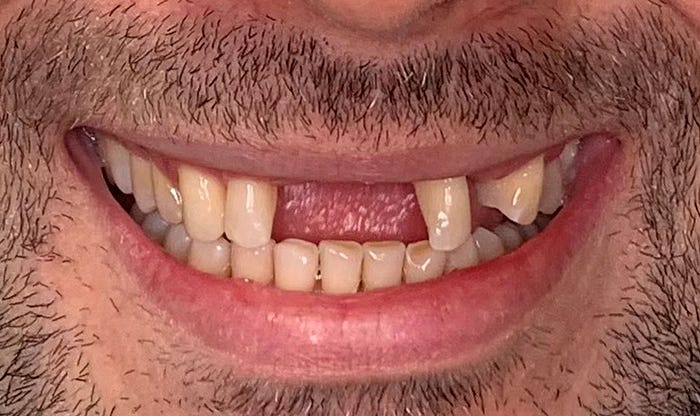More from Dental Implants Dentures
More in Politics
Related Blogs
Archives
Social Share
How to Prepare for a Dental Implant Procedure | Dental Implant Surgery Preparation Tips
Body
Dental implants have become a popular and effective solution for replacing missing teeth. Whether you’ve lost a single tooth or several teeth, dental implants offer a long-term solution that looks and feels like natural teeth. However, to ensure a successful dental implant procedure and optimal results, proper preparation is essential. Here are some tips to help you prepare for your dental implant surgery.
1. Schedule a Consultation with URBN Dental
Before undergoing any dental procedure, including dental implant surgery, it’s crucial to schedule a consultation with us at URBN Dental in Houston. During this initial appointment, we will evaluate your oral health, discuss your treatment options, and address any concerns or questions you may have about the dental implant procedure.
2. Understand the Dental Implant Procedure
It’s essential to have a clear understanding of what to expect during the dental implant procedure. Dental implant surgery involves the placement of artificial tooth roots into the jawbone to support a replacement tooth or bridge. The process typically requires multiple appointments and several months to complete, as the implants need time to fuse with the surrounding bone. Visit us for more information :- Dental implant specialist

3. Maintain Good Oral Health
Prior to your dental implant surgery, it’s important to maintain good oral hygiene habits. This includes brushing your teeth regularly, flossing daily, and scheduling regular dental cleanings and check-ups. Good oral health can help reduce the risk of complications during and after the dental implant procedure, such as gum disease or tooth decay.
4. Provide Your Medical History
During your consultation with us at URBN Dental, be sure to provide a comprehensive medical history, including any medications you are currently taking and any existing medical conditions. Certain medical conditions or medications may impact the dental implant procedure or affect your recovery process. It’s important for us to have all the relevant information to ensure your safety and the success of the dental implant surgery.
5. Discuss Anesthesia Options
Dental implant surgery is typically performed under local anesthesia to numb the implant site and minimize discomfort during the procedure. However, if you have dental anxiety or prefer additional sedation, such as oral sedatives or intravenous (IV) sedation, discuss these options with us during your consultation. We will work with you to determine the most appropriate anesthesia option based on your individual needs and preferences.
6. Follow Pre-Surgery Instructions
In the days leading up to your dental implant surgery, it’s important to follow any pre-surgery instructions provided by us at URBN Dental. This may include guidelines on eating and drinking before the procedure, as well as any medications to avoid. Following these instructions can help ensure a smooth and successful surgery.
7. Consider Bone Grafting
If you have experienced bone loss in the jawbone due to missing teeth or periodontal disease, you may require a bone graft before undergoing dental implant surgery. A bone graft helps restore the bone density and volume necessary to support dental implants. During your consultation, we will assess your bone quality and discuss whether bone grafting is necessary for your dental implant procedure.
8. Plan for Recovery
After your dental implant surgery, it’s important to plan for a period of recovery and downtime. You may experience minor bleeding, swelling, and discomfort in the days following the procedure. Plan to take time off work or school to rest and allow your body to heal properly. During this time, it’s essential to follow any post-operative instructions provided by us at URBN Dental, including taking prescribed medications and eating soft foods to avoid putting pressure on the implant site.
9. Attend Follow-Up Appointments
Following your dental implant surgery, it’s crucial to attend all scheduled follow-up appointments with us at URBN Dental. These appointments allow us to monitor your healing progress, ensure that the implants are integrating properly with the surrounding bone, and address any concerns or complications that may arise. Regular follow-up care is essential for the long-term success of your dental implants.
10. Practice Good Oral Hygiene
Once your dental implants have fully healed and the replacement teeth have been attached, it’s important to practice good oral hygiene to maintain the health and longevity of your implants. This includes brushing and flossing regularly, using antimicrobial mouthwash, and scheduling regular dental check-ups and cleanings. By taking care of your dental implants and surrounding oral tissues, you can help ensure their long-term success and functionality.
Dental Implants FAQs
Can anyone get dental implants?
While dental implants are a suitable option for many people, not everyone is a candidate for this procedure. Factors such as overall health, oral health, and bone density in the jawbone will be assessed to determine if dental implants are the right choice for you. Our team at URBN Dental will conduct a thorough evaluation during your consultation to determine your eligibility for dental implant surgery.
How long do dental implants last?
With proper care and maintenance, dental implants can last a lifetime. Unlike dentures or dental bridges, which may need to be replaced every few years, dental implants are designed to be a permanent solution for replacing missing teeth. Regular dental check-ups and good oral hygiene habits are essential for ensuring the longevity and success of your dental implants.
Is dental implant surgery painful?
Most patients report minimal discomfort during and after dental implant surgery. Local anesthesia is used to numb the implant site, and any post-operative pain can typically be managed with over-the-counter pain medication. Our team at URBN Dental will take steps to ensure your comfort throughout the procedure and provide guidance on managing any discomfort during the recovery period.
How soon can I eat after dental implant surgery?
Following implant surgery, it’s important to stick to a soft diet for the first few days to allow the implant site to heal properly. You can gradually reintroduce solid foods as tolerated, but avoid chewing directly on the implant site until it has fully healed. Our team will provide specific dietary guidelines and recommendations based on your individual needs and the extent of your surgery.
What should I do if I experience complications after surgery?
While complications after dental implant surgery are rare, it’s important to contact us at URBN Dental if you experience any unusual symptoms or complications, such as excessive bleeding, severe pain, or signs of infection. Our team is here to address any concerns you may have and provide prompt treatment to ensure the success of your dental implants.
Can dental implants fail?
While dental implant failure is uncommon, it can occur in some cases. Factors such as poor oral hygiene, smoking, certain medical conditions, and inadequate bone density can increase the risk of implant failure. Following proper oral hygiene practices, attending regular dental check-ups, and avoiding behaviors that can compromise the integrity of the implants can help reduce the risk of implant failure.
How much do dental implants cost?
The cost of dental implants can vary depending on factors such as the number of implants needed, the complexity of the surgery, and any additional procedures required, such as bone grafting. During your consultation with us at URBN Dental, we will provide you with a personalized treatment plan and discuss the cost of your dental implant procedure. We also offer flexible payment options and financing plans to help make dental implants more affordable for our patients.
Preparing for a dental implant procedure involves thorough planning, communication with your dental provider, and commitment to maintaining good oral health before and after the surgery. By following these preparation tips and working closely with us at URBN Dental, you can achieve optimal results and enjoy the benefits of a beautiful, healthy smile with dental implants. Please schedule an appointment at your nearest URBN Dental office to explore your implant options.












Comments